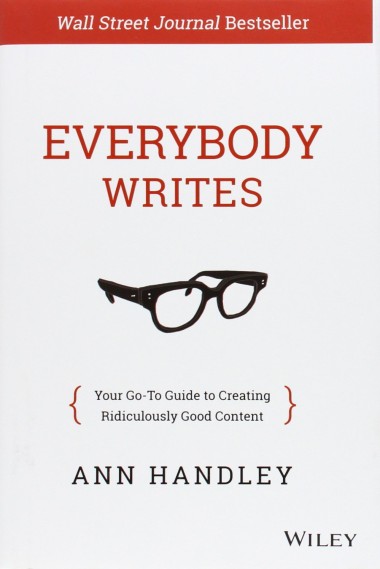Want to see what other books we’ve covered? Read our other reviews in the SEJ Book Club archive.
Everybody writes. Do you agree?
Long before Ann Handley’s book was even launched, it had already sparked some heated conversations online. The premise of Everybody Writes (affiliate link) was exactly that. However, many argued that the book sounded like an attack to professional writers. Here are some of the comments posted on isoosi.com:
I’m constantly devalued because of posts like this one perpetuating no expertise is required to “write a blog post.”
When my toilet breaks, I don’t fix it because “everyone can be a plumber.” I pay a plumber to do it for me, because my time is money, too.
These arguments make perfect sense. But one of the readers also raised a valid point – it’s all about changing mindset. When people think they can’t do a particular task, they never give it a shot.
I agree.
In fact, when I started my first blog back in 2011, the first line on my about page  was: “I’m no writer.” And this is why I chose to review Everybody Writes for the SEJ Book Club. I was the perfect acid test to see if the book works.
was: “I’m no writer.” And this is why I chose to review Everybody Writes for the SEJ Book Club. I was the perfect acid test to see if the book works.
Being a brand marketer for many years, I’ve long understood the importance of good writing. Although I write copy for marketing materials like flyers, sales kit, and spiels, I am in no way a professional copywriter. The idea of writing long form content scares me. But after transitioning to the digital world where (say it with me) content is king, I was adamant to improve my writing. And If I succeed, I’m going to be the social proof that even “non-writers” can write better.
Let me share the four writing mistakes I was habitually making:
1. NOT Setting Clear Writing Goals
I often write as a way to figure out what I wanted to say. And I noticed this often takes me more time, more rewrites, and results in writing with an unclear message. You have to ask yourself what information are you trying to get across? What will make your story unique? More importantly, don’t forget the so what or what’s in it for your readers.
Noob Tip: I have these three questions written on a sticky note posted on my desktop as a constant reminder.
2. The More Words, the Better
I was an avid user of word fillers, modifiers, and adverbs. One rule that was mentioned throughout the book was cut the fat. You need to put the most important thoughts at the beginning of the sentence. This highlights what’s important and eliminates the distractions.
Noob Tip:
- Ways by which = ways
- Continues to be = remains
- The majority of = most
- Use adverbs sparingly and only if they will alter meaning (like in this sentence)
- Reposition in the middle of the sentence or ditch if possible:
- According to
- It is important
- In my opinion
- The purpose of this
- In 2014
- I think, believe
3. Telling a Story is Enough
Storytelling? I can do that for sure. Next chapter please. But after a reading a few more lines, the message was clear. You have to tell a true story well. This starts by putting your reader in the story. Perhaps describing a problem they can relate too. This will make them read on and stay longer.
Noob Tip:
- Paint a vivid picture and use specific details to be believable (e.g., cappuccino instead of coffee).
- Don’t hard sell. Instead make them aware why your story matters to them.
- Use familiar yet surprising analogies (e.g., site’s load speed was as slow as tortoise)
4. Grammar Rules You Should NEVER Break
It surprised me when Ann Handley said grammar was secondary. She insisted good writing is more about thinking and keeping your focus relentlessly on your reader. Of course, reading an article with poor grammar is like meeting your CEO in your jammies, so it should never be neglected. One basic rule is to use the active voice whenever possible. They make your sentence bolder and impactful. She also discourages the use of made up words such as awesome sauce or web terms like bandwidth.
NoobTip: Grammar rules you CAN break
- Never start a sentence with but, and or because. These words often help the flow of writing.
- Avoid sentence fragments. Use them when they help emphasize a point.
- Never end a sentence with a preposition. Even editing tools like Pro Writing Aid, prompt me whenever I end my sentence with of or at, but if it helps complete the thought of the sentence, then it should be fine.
- Never write a paragraph that’s a mere one sentence long. On the web, white space plays a big role with readability.
The deal breaker question is: Did I get better? After reading the book and writing a couple of blog posts, I started getting positive feedback. One was from my biggest critic, my husband. “You got that from the book, didn’t you?” he asked.
I’ll end my post with a snippet of Ms. Handley’s rebuttal in the controversial blog post:
“Very surprised that so many people see the book as an attack on content creators, of which I am one. I was simply making the point that we all can and should become better writers.
In our increasingly content- and social media marketing-driven world, all of us need to write with more clarity and brevity than ever before. So I’m asking marketers to embrace the idea that we are all capable of good writing—or at least better writing.”
Have you read Ann Handley’s book? Would love to hear how it has helped you.
Next Month’s Book

Next month, SEJ Editorial Assistant Aki Libo-on will be reviewing Killer Web Content by Gerry McGovern (affiliate link). Feel free to pick up a copy from Amazon or your local library and read along with us!
Want to see what the SEJ Book Club has read or is planning on reading next? Check out our GoodReads profile and add us as a friend!
This post contains Amazon affiliate links.
Image Credits
Featured image created for Search Engine Journal.
All screenshots taken March 2015.





